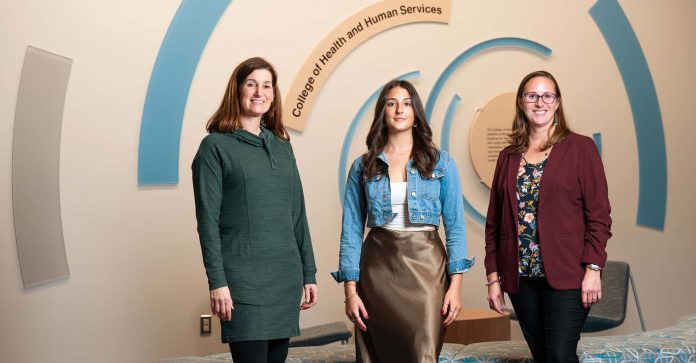There is a hidden gem program at Southern, but the Health and Wellness Coaching bachelor’s degree won’t be the world’s best-kept secret for long.
It is the first program of its kind in the Northeast, and its creation may well have been a stroke of serendipity. That, and the gifted, creative thinking of a team of educators.
Deb Risisky, Jim MacGregor, and Gary Morin collectively developed the concept for a B.S. degree in health and wellness coaching, garnering approval from the Board of Regents last spring. Risisky is a professor of public health, MacGregor is chair of the Recreation, Tourism and Sport Management program, and Morin is department chair for Health and Movement Sciences. Morin then passed the baton to Assistant Professor Sarah Benes, coordinator of the School Health Education master’s program, who is a certified health and well-being coach. She helped develop the courses for the new degree program.
The idea took flight after the COVID-19 pandemic, when lockdowns forced people to stay home and subsequently limited opportunities for exercise and fitness. As the world returned to its previous health behaviors, the need for coaching exploded, Risisky said.
“We know that these behavioral changes are hard. People need support and this is a great way to offer individualized support,” Risisky said.
Many students are interested in a career in helping others, which positions the program for success, she added.
“One thing about this program, it helps you help people. When you have that orientation toward wanting to be a helper, with the skills learned in this program, you can help people in all sorts of ways,” Benes said. “It’s that whole orientation of helping someone feel better. What’s more rewarding than that?”
The program’s first — and currently only — student is freshman Lindsay Tryon, who learned about it when she met with her advisor last summer. Tryon was interested in nutrition and exercise science, areas that she struggled with during the pandemic. That discussion illuminated her career aspirations, making the coaching career possibility exciting and relevant to her.
“For a while, I was just wanting to help people figure out their balance with life and be able to maintain a healthy lifestyle,” Tryon said. “The program opened my eyes that this is a big problem for people. They want to get healthy, but they automatically think that means to exercise and decrease food. While that is, in some cases, the thing to do, people don’t know how to do it the right way,” she said.
Tryon’s take on the impact of a health and wellness coaching career is spot on, Risisky said.
“As a coach, you’re not talking, you’re listening. We don’t often really get listened to. It’s an opportunity to connect with someone and make a meaningful difference in someone’s life,” Benes said.
The B.S. degree creates opportunities for a variety of jobs, including health and wellness coach, worksite health coach, and behavioral health technicians. Coordinators designed the program so that graduates will be eligible to sit for the National Board of Health and Wellness Coaching certification exam once the program is approved.
The potential roles for this degree are many and growing. Among them: community health centers, medical offices and schools. Entrepreneurial-minded students could become small business owners, creating their own coaching business.
Research shows that there is a need for health and wellness coaches. A 2023 workplace wellness survey surfaced health coaching in its top results, Risisky said.
While some universities offer the health and wellness curriculum as part of continuing education certificates, Southern’s program offers it as a focused degree.
“We are the only ones, the first in the Northeast to do a bachelor’s program in this. It’s innovative to do it in a bachelor’s, to start there and build up. It’s a great way to tailor it. We’re excited about students finding it and coming to it,” Risisky said.
In joining the effort to create the program, Benes has the certification that the core team wanted to emulate. While she manages that full-time role, this new program was an opportunity to be a key contributor to a groundbreaking program.
“I’m a change-the-world kind of person. There’s so much potential to make a real impact on campus and beyond. This can have a huge impact on others. It gives me that feeling, I can’t believe I get to do this,” Benes said.
The program has drawn the attention of Connecticut-based WellSpark, which provides customized well-being programs to employers to help support their workforce through optimizing personal wellness. WellSpark is excited to have a local degree program from which to draw certified coaches, Risisky said.
Corporations also recognize the role they play in supporting the trend. “This is a huge innovation for Southern that we hope we can draw students from outside of Connecticut, too. As other schools may add it in, we’ll have been at the forefront,” Risisky said.
While the program has one student now, Risisky and Benes said they’re using social media, marketing, and open house opportunities to reach students and invite them to explore the possibilities for themselves.
That approach is a good start. Tryon said many students are already interested in staying fit but may not realize they can find their calling in that personal interest.


